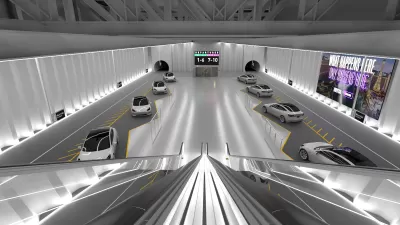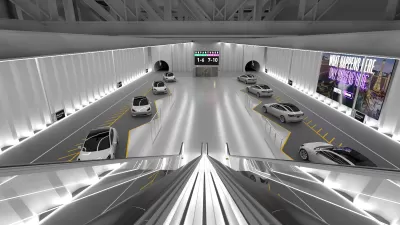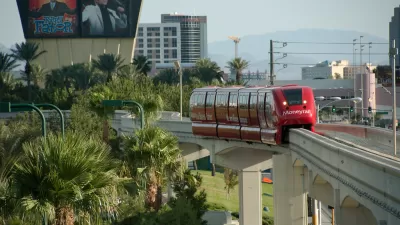It seems like the Las Vegas Convention and Visitor’s Authority expected trouble with The Boring Company, and built a contract that will impact Elon Musk's bottom line for falling short of agreed system capacity and construction timelines.

Mark Harris provides on an investigative report into shortcomings in the people mover planned by Elon Musk's The Boring Company (TBC) for the Las Vegas Convention Center (LVCC). Planning files reviewed by TechCrunch "seem to show that the Loop system will not be able to move anywhere near the number of people LVCC wants, and that TBC agreed to."
The LVCC wanted a system that could move up to 4,400 attendees every hour between exhibition halls and parking lots, according to Harris. But: "Fire regulations peg the occupant capacity in the load and unload zones of one of the Loop’s three stations at just 800 passengers an hour. If the other stations have similar limitations, the system might only be able to transport 1,200 people an hour — around a quarter of its promised capacity."
Failing to hit the targets laid out in the agreement would cost The Boring Company a lot of money—more than $13 million of the construction budget and millions more in penalties, reports Harris.
Harris provides more analysis of the project, as planned by The Boring Company, and notes that the LVCC anticipated the gamble it was taking on this untested application of Musk's ideas about transportation infrastructure. So when the Las Vegas Convention and Visitor’s Authority wrote its contract with The Boring Company, "it did its best to incentivize Musk to deliver on his promises," according to Harris.
Harris updates the expected timeline for the project, which was tied to payments, noting that one big milestone, the completion of the entire working system, already passed on October 1.
Previous Planetizen coverage of the Las Vegas Convention Center Loop project:
FULL STORY: Elon Musk’s Las Vegas Loop might only carry a fraction of the passengers it promised

Maui's Vacation Rental Debate Turns Ugly
Verbal attacks, misinformation campaigns and fistfights plague a high-stakes debate to convert thousands of vacation rentals into long-term housing.

Planetizen Federal Action Tracker
A weekly monitor of how Trump’s orders and actions are impacting planners and planning in America.

Chicago’s Ghost Rails
Just beneath the surface of the modern city lie the remnants of its expansive early 20th-century streetcar system.

Bend, Oregon Zoning Reforms Prioritize Small-Scale Housing
The city altered its zoning code to allow multi-family housing and eliminated parking mandates citywide.

Amtrak Cutting Jobs, Funding to High-Speed Rail
The agency plans to cut 10 percent of its workforce and has confirmed it will not fund new high-speed rail projects.

LA Denies Basic Services to Unhoused Residents
The city has repeatedly failed to respond to requests for trash pickup at encampment sites, and eliminated a program that provided mobile showers and toilets.
Urban Design for Planners 1: Software Tools
This six-course series explores essential urban design concepts using open source software and equips planners with the tools they need to participate fully in the urban design process.
Planning for Universal Design
Learn the tools for implementing Universal Design in planning regulations.
planning NEXT
Appalachian Highlands Housing Partners
Mpact (founded as Rail~Volution)
City of Camden Redevelopment Agency
City of Astoria
City of Portland
City of Laramie





























